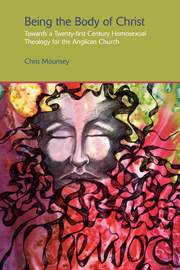Book contents
- Frontmatter
- Contents
- Introduction: Homosexuality and Anglicanism
- PART I
- 1 Oscar Wilde: ‘The Fisherman and His Soul’ – The Failure of Organized Religion
- 2 E.F. Benson: The David Blaize trilogy, A Sexuality Fit for My Lord – E.F.B., God and the Archbishop
- 3 E.F. Benson: The David Blaize trilogy, A Sexuality Fit for My Lord – The Closet of Nightmares
- 4 E.F. Benson: The David Blaize trilogy, A Sexuality Fit for My Lord – The Release of Masturbation
- 5 E.F. Benson: The David Blaize trilogy, A Sexuality Fit for My Lord – From Boy Love to Manly Love: Marriage, Ministry and Maintaining the Gift of Continency
- PART II
- Conclusion: Blindness and Insight – Some Reflections
- Select Bibliography
- Subject Index
- Author Index
1 - Oscar Wilde: ‘The Fisherman and His Soul’ – The Failure of Organized Religion
from PART I
- Frontmatter
- Contents
- Introduction: Homosexuality and Anglicanism
- PART I
- 1 Oscar Wilde: ‘The Fisherman and His Soul’ – The Failure of Organized Religion
- 2 E.F. Benson: The David Blaize trilogy, A Sexuality Fit for My Lord – E.F.B., God and the Archbishop
- 3 E.F. Benson: The David Blaize trilogy, A Sexuality Fit for My Lord – The Closet of Nightmares
- 4 E.F. Benson: The David Blaize trilogy, A Sexuality Fit for My Lord – The Release of Masturbation
- 5 E.F. Benson: The David Blaize trilogy, A Sexuality Fit for My Lord – From Boy Love to Manly Love: Marriage, Ministry and Maintaining the Gift of Continency
- PART II
- Conclusion: Blindness and Insight – Some Reflections
- Select Bibliography
- Subject Index
- Author Index
Summary
Introduction
Typically, critical writing on Oscar Wilde's religion centres upon his several unsuccessful attempts to convert to Roman Catholicism, his personal association (Jesuitical?) with Christ found in works dating from during and after his imprisonment, and a discussion about whether his deathbed conversion to Roman Catholicism was conscious or whether he was in a terminal delirium. What seems wanting about the response to Wilde's religious conviction is that it never moves far from the question of a lifetime dabbling with Roman Catholicism that tends to be read in opposition to atheism. Whereas, and a fact that is conveniently forgotten, Wilde was a nominal Anglican all his life. In terms of religious belief the adjective ‘nominal’ may seem strange, however, the designation all but defines the religious life of the majority of British Protestants, and before the 1920s, Irish Protestants as well. Church going at the local parish church was expected, unquestioned and largely unengaged.
I shall argue in this chapter that throughout his life Wilde was always inspired by spiritual concerns and worried about the fate of his soul, and in this sense, unengaged nominal Anglicanism did not suit him. However, nor was there a place for him in the Catholic church because of his sexual preference for men, something which it thought of as a sin, and moreover, a sin which the Catholic church could not bring itself to forgive.
- Type
- Chapter
- Information
- Being the Body of ChristTowards a Twentieth-Century Homosexual Theology for the Anglican Church, pp. 11 - 34Publisher: Acumen PublishingPrint publication year: 2012

